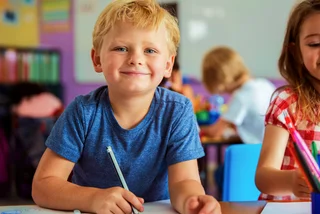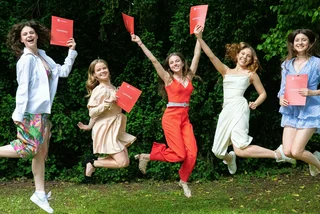Czech families are increasingly recognizing the importance of fluency in English from an early age and a growing number of parents, especially in situations where the other parent is not Czech, are opting for a bilingual education for their children.
We spoke to Petra O’Leary, Head of Česko Britská Základní Škola at the Prague British International School. She explained the advantages of a bilingual education, and outlined the key differences between the local Czech school system, an international school, and a bilingual school.
What is a bilingual education?
“A bilingual or dvojjazyčný education takes place in two languages – a foreign language and the mother tongue – where the emphasis is on developing the foreign language as well as the mother tongue,” says O’Leary. “At Česko Britská Základní Škola (ČBZŠ) we use the OPOL method - One Person, One Language - which means that a teacher who is English speaks English to children, and a teacher who is Czech speaks Czech to them. At ČBZŠ teachers don’t mix languages, and after three years at the school students can speak both Czech and English fluently.”

What is the difference between a bilingual school and an international school?
“At international schools, most students will be the children of expats who are working on short to mid-length contracts (generally 2-5 years). This does not necessarily mean that all of the children are fluent English speakers, as many of them will come from non-English speaking countries. The children are sent to international schools as they are unable to access the local Czech system, and prefer to be enrolled in a school that offers an international programme, which is easily accessible elsewhere in the event of a change of country.
On the other hand, most students attending bilingual schools are local children. These children will speak Czech as their first language, and the parents of these children are looking for their child to experience an international-style education while keeping their Czech heritage. These children are more likely to stay in one school throughout their school lives and move to English-speaking countries for university.

Bilingual schools differ from international schools as they are much less rigidly tied to one set curriculum. This gives teachers a lot more freedom to cater to the specific needs of their class. Teachers have great freedom to be incredibly creative and innovative in their teaching methods, so long as they ensure that children meet the appropriate Czech National Curriculum goals.”
Who is bilingual education recommended for and why?
“Bilingual education at ČBZŠ is recommended for fluent Czech speakers, not just from the Czech Republic, but also from international communities. Our students are mainly from Czech families who are aware that English is a necessity in the world of today, but we also have children from mixed or foreign language families. The only condition is the child must be a fluent Czech speaker.”
The benefits of a bilingual education
- Increased cognitive development
Children that know a second language perform better in tasks that call for creative thinking, pattern recognition and problem solving. Young learners develop greater linguistic awareness and a more complex understanding of their native language.
- Better academic achievement
Studies have shown that students who had a bilingual education and that spoke multiple languages had greater achievements than their monolingual peers, especially in maths, reading and vocabulary.
- Improved memory
Research has indicated that bilingual people are usually better at remembering names, directions and items than those who speak one language.
- Cross cultural appreciation
Students are able to engage with languages through folk tales, songs, idioms and other primary sources of information without requiring translation leading to a deeper understanding of different cultures.
- Improvements in the executive function of the brain
Bilingual people are better able to sort out relevant information from irrelevant information, meaning they can focus better and be more effective thinkers and decision-makers.
- Increased economic opportunities
The ability to conduct business in more than one language is a vital asset in a rapidly changing world. Bilingual people often hold higher positions and earn better incomes than their monolingual counterparts in the same industry.
How is ČBZŠ’s programme different from what’s available in local state schools in terms of bilingual education?
“In ordinary Czech schools, students start to study the first foreign language in Y4 for at least three lessons a week, and another foreign language is added in Y9. Whereas at ČBZŠ, children study English daily starting from Y1, and selected subjects, such as music and PE (physical education), are taught only in English. The opportunity to learn another foreign language – German, Spanish or French – is possible from Y3.
Another differentiation is class size - in regular Czech schools class sizes of up to 24 are permitted, whereas in ČBZŠ the maximum number of pupils in a class is 18. Also, in ČBZŠ, languages are taught by native speakers who are qualified primary school teachers.
In ČBZŠ, pupils are taught according to two adjacent curricula - Czech and British, while these intertwine and use each other's strengths. Thanks to this, students are exposed to various methods of work and study and can choose those that suit them the most. The same applies to teaching materials. We use the same textbooks and study materials as children in the UK. As a result, children's horizons broaden and become truly multicultural.”

Why should parents consider a bilingual education for their child?
“The essence of a bilingual education is not simply the process of learning and studying two languages as subjects; it is the incorporation of the language into the actual teaching process. A bilingual education means studying your science, maths, art, and drama lessons in two languages. In this way it teaches the application of languages better than a few English lessons per week could.
The difference between learning a language in set lessons and learning it in an immersive environment is that students are more deeply locked into the language and its everyday use, ideally from an early age. They develop their skills more organically than learning from a set curriculum, as is the case for most monolingual children.
Bilingual education has been proven as a secret weapon in supercharging children’s learning and even changing the structure of the human brain. At ČBZŠ, bilingual education is an essential part of our curriculum, setting a child up for long-term educational benefits and a lifetime of learning.”
This article was written in cooperation with the Czech British Primary School (Česko Britská Základní Škola) at the Prague British International School. Read more about our partner content policies here. ČBZŠ will host a virtual open day on April 8, 2021, via Zoom. Sign up to attend here.












 Reading time: 5 minutes
Reading time: 5 minutes 



















